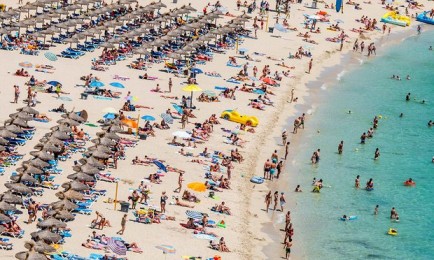
Another bumper summer is on the cards, but is Spain becoming too popular for its own good?
Packed beaches are nothing new to Spain come the summer months. Be it the Costa de Sol, the Costa Brava, the Balearics or the Canaries, finding a spare patch of sand on which to bronze under the Spanish sunshine has always been something of a battle – but that has long been part of Spain’s appeal…
A summer holiday in Spain isn’t a real holiday if the bars aren’t heaving, the restaurants packed, the nightclubs pounding and the roads jammed. Weirdly, this all adds up to that evocative cocktail that only Spain offers: two-weeks of non-stop fun, played out to a backdrop of what at times feels chaotic but is actually a shining example of Spain’s ability to handle an influx of millions of tourists all at once.
But recent reports on the forthcoming summer season have attempted to detect something akin to tourism fatigue. From suggestions that summer holiday places could sell out, to very real concerns that the sheer number of people visiting places like Majorca and Barcelona each year is so great that it is damaging important eco and historical sites, there have been a few grumblings in recent months that Spain is just… well, too popular.
This year promises to be a real bumper summer for Spain. Normally, sunworshippers are evenly spread out across the Mediterranean, but with the heightened terrorist threats in Tunisia, Egypt and Turkey, travel operators have recorded a noticeable upturn in Spanish bookings.
On Ibiza, the number of cruise ships expected to dock there this summer is up 28%, while the 65 million people who visited Spain last year could swell by as much as 20% in 2016. Palma airport on Majorca has increased its airport capacity to handle 100 flights a day this summer. Last year, that figure was 66 flights daily.
In Barcelona, the city mayor Ada Colau has agreed to a request by stallholders at the famous La Boqueria market to ban large groups of tourists from entering at certain times of the day, and the city will not give any more licences for tourist accommodation – the city is full in summer, comes the message.
All of this is ostensibly great news for local businesses that are reliant on tourism. But the problems are beginning to mount, others feel. Already, Majorca is taking steps to ensure its popularity does not become its downfall. On June 1 the island is introducing a €2 per day eco tax, which is levied on all visitors and steered towards environmental conservation efforts.
The Balearics President, Francina Armengol, has also expressed concerns that the good money to be made working as a waiter on the islands could actually stop young people from entering more serious professions.
These are all valid concerns, and many countries – particularly cash-strapped Greece – would love to have to deal with such “problems”, but it is worth remembering just why Spain is so perennially popular – it’s all about balance.
 en
en



 Vlaams-Nederlands
Vlaams-Nederlands
0 Comments
Leave a Comment
DISCLAIMER
The opinions and comments expressed by contributors to this Blog are theirs alone and do not necessarily reflect the views of VIVA Homes Under the Sun Ltd, any of its associated companies, or employees; nor is VIVA to be held responsible or accountable for the accuracy of any of the information supplied.
Have you got something to say?